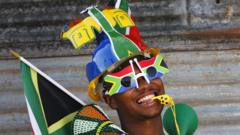South Africa's vibrant linguistic contributions have made their way into the Oxford English Dictionary (OED), with several local words now immortalized in its latest update. This diverse collection, which can be considered a celebration of the nation's rich cultural heritage, includes expressions and colloquialisms that embody the spirit of South African life.
Words like "Yoh", an interjection expressing surprise or distress, alongside "gatvol", a term reflecting irritation or frustration, illustrate the unique patchwork of South Africa's twelve official languages. As noted by the OED, "Yoh" has roots tracing back to 1855, while "gatvol" dates to 1980. Both terms encapsulate deep emotional responses, offering insight into daily frustrations and exhilarations.
Further colloquial offerings include "tjoekie", referring to jail, and "zola", which implies smoking marijuana. The former has its origins in an acquaintance from Indian immigrants, while the latter connects to contemporary slang that signifies a cultural shift towards acceptance around cannabis use in society.
The use of "seshweshwe", a vibrant cotton fabric synonymous with traditional South African attire, highlights the country's artistic heritage, while "makarapa", originally a helmet for construction workers, has become a beloved fixture among enthusiastic sports fans, displaying creative and team-specific adornments.
Among other additions, the term "sharp-sharp" reflects casual greetings in South African English, showcasing familiarity and camaraderie in informal interactions. This local lexicon is not just about individual words but represents a broader narrative of South African identity evolving within a global context.
As the global lexicon continues to grow, the incorporation of these distinctive South African terms not only enriches the English language but also underscores the intricate cultural dynamics that characterize the nation. This recognition by the OED marks a significant step in acknowledging the contributions of South African languages to the world stage and paves the way for a more inclusive understanding of global English.




















